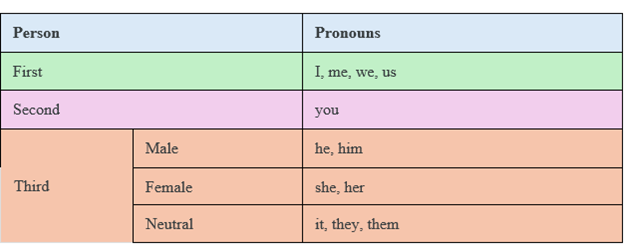Chapter 9.7 Pronouns
A pronoun is a noun that takes the place of a noun or groups of nouns, and because pronouns are “standing in” for nouns, you must be sure that the pronoun you choose to “stand in” agrees with what it stands in for.
Examples
Examples:
- I
- me
- my
- mine
- you
- his
- her
- they
- them
- it
- she
- he
- they
- etc.
If there were no pronouns, all types of writing would be quite tedious to read. We would soon be frustrated by reading sentences like Dora said that Dora was tired or Mohammed told the class that Mohammed received an A. Pronouns help a writer avoid constant repetition. Knowing just how pronouns work is an important aspect of clear and concise writing.
Pronoun Agreement
A pronoun—especially when referring to non-human nouns—must agree in number with the word it refers to (antecedent).
- Singular nouns need singular pronouns.
- o Ex: The house sits on its
- Plural nouns need plural pronouns.
- o Ex: The homes sit on their
- For people: “their” may be used as a singular pronoun.
- o Ex: Someone left their book on the bench.
- o Ex: Someone left his/her/their book on the bench.
Remember this convention: people are more important than grammar rules.
Indefinite Pronouns and Agreement

Indefinite pronouns do not refer to a specific person or thing and are usually singular. Note that a pronoun that refers to an indefinite, non-human singular pronoun should also be singular.
The following are some common indefinite pronouns.

Examples
Example: Everyone (sing.) should do what they (plur.) can to help.
Example: Everyone (sing.) should do what he or she (sing.) can to help.
- Using “they” is acceptable if you do not know the person’s gender identity. “He” or “she” would also be correct if you do know the person’s gender identity.
Example: Each (sing.) of the wild horses raced for its (sing.) freedom.
Collective Nouns and Agreement

Collective nouns suggest more than one person but are usually considered singular. Look over the following examples of collective nouns.

Example
Incorrect: Lara’s company (sing.) will have their (plur.) annual picnic next week.
Correct: Lara’s company (sing.) will have its (sing.) annual picnic next week.
Pronoun Reference
Pronoun reference errors give a lot of beginning writers trouble. A pronoun reference error occurs when you use a pronoun like he or she, and it’s not clear what that pronoun refers to.
Example
Confusing pronoun reference: When Darth Vader and Luke Skywalker were battling with their light sabers, he became angry.
- Who does he refer to? It isn’t clear. A pronoun should clearly refer to its antecedent (the word it replaces), so if the antecedent is not clear, you need to revise. Here’s an example of how you might correct the pronoun reference error:
Clear pronoun reference: When Darth Vader and Luke Skywalker were battling with their light sabers, Luke became angry.
The Word “This”
“This” – cannot be by itself because it doesn’t refer to anything. A noun must always follow the word “this” in writing.
Example
Example: This is pretty. (vague)
- Corrected: This daisy is pretty.
Remember: A pronoun must clearly refer to the word it stands for (replaces), or you can’t use it.
Pronoun Point-of-View (POV)

- First-person POV is the speaker or writer themselves. The first person is personal (I, we, etc.)
- Second-person POV is the person who is being directly addressed. The speaker or author is saying this is about you, the listener or reader. (you, yours, you’re)
- Third-person POV is the most common person used in academic writing. The author is saying this is about other people. In the third person singular there are distinct pronoun forms for male, female, and neutral gender. (he, she, they, them, it, their)

It is important to maintain consistent POV in sentences.
Example
Example: What I like best about vacations is that you don’t have to set an alarm.
- Either use both first-person POV or both second-person (POV).
Corrected (first-person POV) : What I like best about vacations is that I don’t have to set an alarm.
Corrected (second-person POV): What you like best about vacations is that you don’t have to set an alarm.
Corrected (third-person POV): What they like best about vacations is that they don’t have to set an alarm.
Exercise 9.7.1
On a separate sheet of paper, complete the following sentences by selecting the correct pronoun. Also write the word the pronoun replaces (the antecedent).
- In the current economy, my mom does not want to waste ________ money on frivolous things.
- If Jacob chooses to go to medical school, ________ must be prepared to work long hours.
- The plumbing crew did ________ best to repair the broken pipes before the next ice storm.
- The school of education plans to train ________ students to be literacy tutors.
- I thought the flock of birds lost ________ way in the storm.
Exercise 9.7.2
On a separate sheet of paper, identify the pronoun and its antecedent (the word it replaces) in the following sentences.
- I would never wear those ugly shoes; they are an affront to fashion.
- The train is ten minutes late, like it always is.
- Trini brushes her hair every morning.
- The bears left their footprints in our camp.
- Everyone should make their own choices about where to vacation.
Attributions
2.5: Pronouns is shared under a CC BY-NC-SA 3.0 license and was authored, remixed, and/or curated by Anonymous via source content that was edited to the style and standards of the LibreTexts platform.
Pronouns is from Excelsior Online Writing Lab (OWL). This site is licensed under a Creative Commons Attribution-4.0 International License.
Personal Pronouns Revision and Adaptation. Provided by: Lumen Learning. License: CC BY-SA: Attribution-ShareAlike
Media Attributions
- Photo of People Walking in Pedestrian Lane © Mike Chai
- Common Indefinite Pronouns
- Photo of People at a Concert © Nicholas Green
- Common Collective Nouns © Heather Moulton
- Photo of Woman Holding Up a Magnifying Glass © Andrea Piacquadio
- Pronoun POV © Heather Moulton
